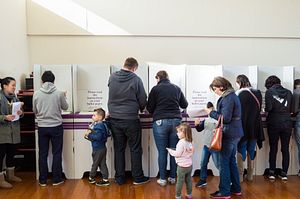It may seem like an obvious thing to say, but democracy has a tendency to produce results that reflect exactly how people are feeling. While party partisans may find Australia’s election this past weekend difficult to comprehend, the general public, disillusioned and unable to find a political vehicle to support enthusiastically, has voted for a stalemate instead.
The consensus leading up to the election was that the conservative Coalition led by Prime Minister Malcolm Turnbull would lose a number of seats, but maintain its majority in the House of Representatives (the chamber where the government is formed). Yet it seemed that the Coalition’s internal polling knew more than the media’s political analysts, with Turnbull urging voters in the weeks leading up to the election to avoid “the chaos of a hung parliament.” This remains a potential result as votes continue to be counted.
Of course, a pedestrian country like Australia doesn’t do chaos. The previous hung parliament elected from 2010-2013 functioned with great ease, although then-Prime Minister Julia Gillard had an excellent ability to negotiate with the independents in the House of Representatives. One strong criticism of the Coalition government that has been in power since 2013 has been its unwillingness to negotiate with the non-major parties in the Senate to pass legislation in both houses.
While a government is yet to be formed, the clear loser in this election is Malcolm Turnbull, who failed to win over his party, and whose political judgement needs to be questioned. Yet more broadly, the Liberal Party itself has been sent into an existential crisis. If the public were becoming increasingly confused by an urbane liberal leading a party of staunch conservatives, they produced the ideal result to test this political alliance.
Since Saturday night, prominent conservative commentators have been calling on Turnbull, a man they despise, to resign, and have been maintaining the delusion that had Tony Abbott remained prime minister the Coalition would have secured an easy majority. This will undoubtedly lead to further tensions within the party, as many within take their cues from the conservative commentariat.
What is becoming more clear is that the Liberal Party now has constituents with diametrically opposed interests: the urban business elite to whom free trade and global connections are highly desired, and the suburban and rural conservatives who are threatened by these globalizing and change-inducing forces.
This can best be understood by the reemergence of the conservative nationalist Pauline Hanson, who is assured of gaining a Senate seat for herself, and could potentially be joined by 2 or 3 more from her One Nation party (and achieved significant support in many Queensland lower-house seats). While nationalist movements in Europe are led by slick, well-spoken manipulators, Hanson’s appeal lies in her rough edges. Those who are drawn to her see articulation and evidence-based arguments as an attempt to swindle them. Hanson’s unrefined approach serves as a vehicle to drive their suspicions of the modern world, from a knee-jerk fear of Islam to a belief that climate change is a conspiracy, and a disdain for offshoring and foreign investment.
While this stubborn ignorance is frequently mocked, Hansonites actually display highly insightful instincts that see a genuine conservatism lying in both cultural and economic protectionism. To them, modern mainstream conservatism is perpetuating a fraud in promoting the idea that a country can engage in global free trade and remain simultaneously unchanged. In this they correctly identify the source of their discomfort, as the world constantly changes the goalposts for them.
Ironically, the group whose culture benefits the most from global free trade are the wealthy, well-educated inner-city Greens voters, who also staunchly profess to hate it.
Malcolm Turnbull attempted to build his prime ministership around an holistic understanding of liberalism, promoting an agile and innovative future, with global free trade agreements sitting comfortably alongside his noted support for multiculturalism and socially progressive markers. Yet he failed to understand the resistance to this that would come from within his own party, nobbling both his vision for the country, and his ability to achieve solid electoral support.
With vote counting still ongoing in a number of close seats, it remains mathematically possible that the Coalition can still receive the seats required to form a majority in the House of Representatives. However, even if they do, a chain of events has been set in motion that could dramatically reshape Australia’s political environment.
One of the Liberal Party’s more outspoken conservative Senators, Cory Bernardi, is actively exploring the idea of forming a new conservative party, releasing the Liberal Party from some of its internal tensions. Which seems to be exactly what the public have voted for.

































